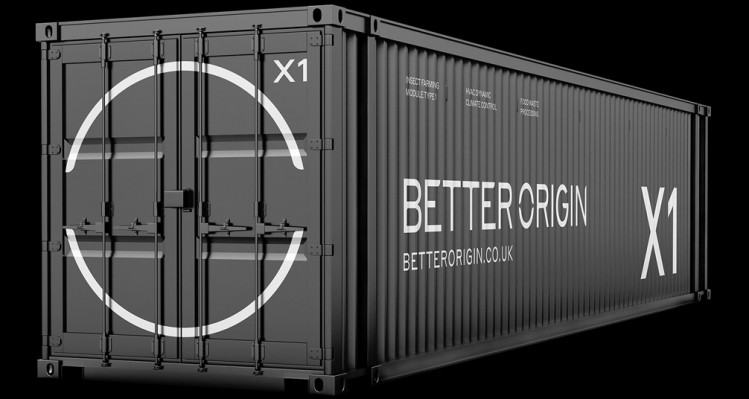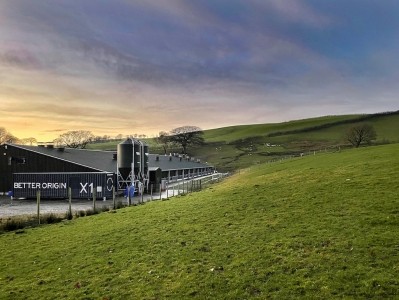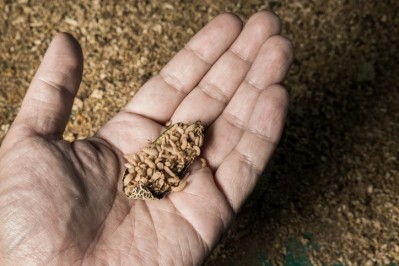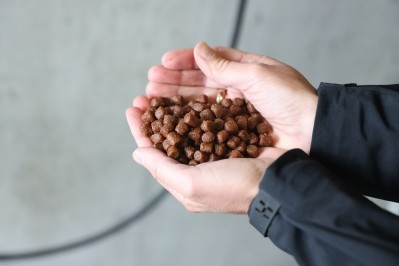Grow your own insects: Better Origin launches miniature farm concept for poultry sector

Poultry producers can now grow their own waste-fed insects for use in feed, following the launch of an autonomous mini-farm from Better Origin.
Shipping containers are being re-fashioned for all manner of uses, from restaurants and portable toilets to art galleries and swimming pools. Arguably, though, one of the most innovative adaptations is to house a mini-insect farm, an idea that has been conceived by University of Cambridge spin-out, Better Origin.
“The process is simple,” Fotis Fotiadis, co-founder of Better Origin, told FeedNavigator. “The eggs and a biomass such as brewers’ grains are put in one end and trays of fully-grown black soldier larvae are taken from the other.”
Th larvae are grown over a 7-14 day period depending on the type of feed required. When ready, the larvae are harvested and delivered direct to the animals. The system does not involve any processing or the use of any additives, said the company.
Artificial Intelligence
What is truly innovative about Better Origin’s X1 mini farm is that it harnesses Artificial Intelligence (AI) to absolve the farmer from having to manage the process.
“It is completely autonomous. It uses camera technology in combination with an algorithm to ‘self-calculate’ optimum parameters such as feed levels, without any human input. Basically, anything that a farmer would do, this system does automatically,” explained Fotiadis.
The mini farms are leased to farmers for a monthly fee, with Better Origin maintaining remote control over all of its systems in the field and intervening remotely if necessary. Farmers can also find out what is going on inside the X1 at any given time via an app-based user interface.
Better Origin’s initial focus is poultry, and the company has carried out trials in conjunction with Bristol University to substantiate the benefits of feeding this larvae to laying birds.
“In trials we have seen a 5% increase in yield as well as an improvement in egg quality and bird activity – high welfare birds produce more eggs,” said Fotiadis.
Sustainable enrichment
However, he doesn’t see this as a replacement for existing feeds – more as an enrichment to poultry diets and a way of producing a proportion of feed more sustainably.
“If we were to supplement 5% of the UK’s poultry feed requirements with our feed, that would correspond to removing 1.5 million cars from the road. It is the only solution that improves both welfare and productivity,” said Fotiadis.
A modular system, the X1 is available in three different capacities, for feeding 15,000, 30,000 or 60,000 birds.
First installations
It is still early days for the start-up. Better Origin installed it first mini farm on a Cambridgeshire farm two weeks before the UK went into lockdown at the end of March. This ran for 3.5 months, until the end of June, when it was transferred to a second shed.
It is currently manufacturing a second container to install on a farm near Birmingham, but has its sights set beyond the UK.
“Our intention is to install the mini-farms throughout the UK and beyond, into Europe and the US. They can be deployed anywhere in the world and set-up takes less than a day,” said Fotiadis.
Also, whilst Better Origin is targeting poultry farms this year, next year it plans to move into the salmon farming market, where initial trials have shown similar benefits as in poultry, namely an improvement in weight and productivity.
“I believe that insects as an ingredient will play more of a role in future. I don’t think there is one solution to the food security challenge – it is a challenge that requires many solutions to come together and create a sustainable food system,” said Fotiadis.













